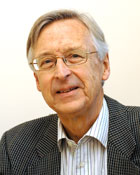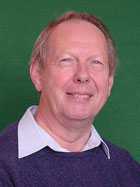- 12 October 2007
Physics award honours neutron professorsí research

Professor Michael Pendlebury

Professor Keith Green
Two Sussex academics have been awarded a major physics prize for their outstanding contribution to research in the subject.
Professor J Michael Pendlebury, Research Professor in Experimental Particle Physics in the University's department of Physics and Astronomy and Professor Keith Green, Visiting Senior Research Fellow at Sussex and Honorary Scientist at the Rutherford Appleton Laboratory, Oxfordshire, have been awarded the Chadwick medal and prize for distinguished research in particle physics in the Institute of Physics (IOP) 2008 awards.
The IOP awards recognise a broad range of physicists in fields as diverse as biological physics, particle and astrophysics.
Professors Pendlebury and Green are being specifically honoured for their outstanding contributions to the measurement of the neutron electric dipole moment, and of other fundamental properties of the neutron. They will receive the award at a special ceremony in London on 24 January 2008.
One of the outstanding mysteries of cosmology is why there is so much more matter than antimatter in the Universe. The key explanation depends on subtle differences in the properties and behaviour of fundamental particles and their antimatter partners - so-called C, P and T symmetry violation. Pinning down the existence of a slight separation of positive and negative electric charges - a permanent electric dipole moment (EDM) - would shed light on the processes in the early Universe that led to the dominance of matter and help to provide a deeper understanding of Nature.
For more than 30 years, Professors Pendelbury and Green have been carrying out a series of experiments at the Institut Laue Langevin in Grenoble, France, to measure the neutron EDM with ever-increasing sensitivity. These experiments involve storing ultra-cold neutrons and making subtle magnetic measurements in an electric field. They are some of the most sensitive measurements that it is possible to make in physics. Recent work using novel equipment has substantially increased the sensitivity, leading to an EDM value considerably less than that predicted by many models.
Professor Pendlebury says: "I am delighted to have this connection with Chadwick, the British physicist who discovered the neutron in 1932. Our group at Sussex including myself started work on measuring properties of the neutron in 1965 and were soon joined by the group at the Rutherford Appleton Laboratory, which includes Professor Keith Green. We are still actively engaged in this programme."
Professors Pendlebury and Green are playing leading roles in the development of the next-generation experiment expected to lead to a more than ten-fold increase in sensitivity, thereby adding further to the understanding of the fundamental nature of matter.
Professor Green says: It was with great pleasure and surprise that we heard news of the award of the IOP Chadwick medal. I have known and worked with Mike for over 30 years in this area of physics research but to me it represents the success of our two groups (mine at the Rutherford Laboratory and Mike's in Sussex) in working closely together on this fundamental physics problem. It is indeed a great honour which reflects well on our two institutions in collaborative research."
Notes for editors
- The Institute of Physics (IOP) is a scientific membership organisation devoted to increasing the understanding and application of physics. It has an extensive worldwide membership (currently over 34,000) and is a leading communicator of physics with all audiences from specialists through government to the general public. Its publishing company, Institute of Physics Publishing, is a world leader in scientific publishing.
- For more information about physics at Sussex, see Physics and Astronomy
University of Sussex Press office contacts: Maggie Clune or Jacqui Bealing. Tel: 01273 678 888 or email press@sussex.ac.uk